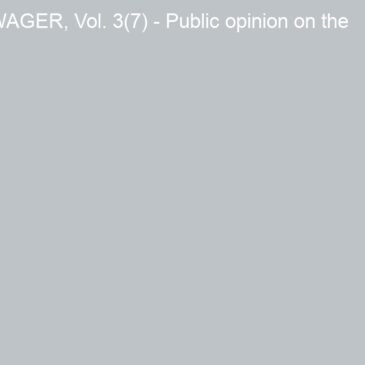The United States is often considered a diverse country with a substantial range of values and beliefs. A variety of activities, including gambling, drug use, and prostitution, have been legislated or prohibited depending upon whether the public considers these activities a threat to society’s moral order or public safety. However, Americans have displayed considerable ambivalence about the extent to which certain activities threaten society. For example, prohibition of alcohol gained enough support to amend the Constitution in 1919 (Amendment 18) and was repealed in 1933 (Amendment 21); society is currently making decisions on restrictions of tobacco sales and advertising. Researchers recently assessed public opinion towards seven activities considered “moral offenses” by at least a segment of the American population [1]. Telephone interviews with 1522 randomly selected adult members of households selected by random-digit dialing procedures provided the data for this evaluation. Interviewers asked respondents the following question about “moral offenses”: “Although some are currently legal, please tell me which of the following you think should be legal.” As the figure below indicates, U.S. adults supported the legal status of alcohol, gambling, and cigarettes. Altogether, 70% of respondents supported legalized gambling. Group comparisons revealed that males supported the legal status of gambling significantly more than females (75.1% to 64.9%), Catholics more than Protestants (82.6% to 60.4%), and the Northeast and Western region of the U.S. more than the Midwest and the South. Historically, societal support of gambling has shifted over the past few decades [2]. The authors point out that while cigarette smoking currently is losing support as a socially acceptable behavior, the public support for gambling activity seems to be increasing. The public’s awareness of the potential adverse consequences of gambling may be meaningfully less than their appreciation of the negative effects of smoking. Future research will be necessary to determine if the public will support gambling even if they are aware of the adverse consequences that are associated with gambling.
Sources:
- Cosby, A.G., May, D.C., Frese, W., & Dunaway, R.G. (1996). Legalization of crimes against the moral order: Results from the 1995 United States survey of gaming and gambling. Deviant Behavior: An Interdisciplinary Journal, 17, 369-389.
- Rose, I.N. (1995). Gambling and the law: Endless fields of dreams. Journal of Gambling Studies, 11, 15-33.




